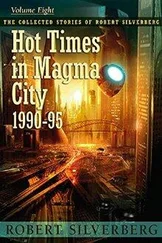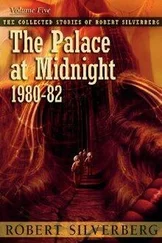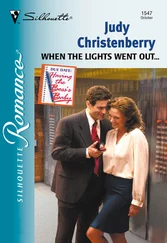Robert Silverberg - How it Was When the Past Went Away
Здесь есть возможность читать онлайн «Robert Silverberg - How it Was When the Past Went Away» весь текст электронной книги совершенно бесплатно (целиком полную версию без сокращений). В некоторых случаях можно слушать аудио, скачать через торрент в формате fb2 и присутствует краткое содержание. Год выпуска: 2007, ISBN: 2007, Издательство: Subterranean Press, Жанр: Фантастика и фэнтези, на английском языке. Описание произведения, (предисловие) а так же отзывы посетителей доступны на портале библиотеки ЛибКат.
- Название:How it Was When the Past Went Away
- Автор:
- Издательство:Subterranean Press
- Жанр:
- Год:2007
- ISBN:978-1-59606-089-0
- Рейтинг книги:4 / 5. Голосов: 1
-
Избранное:Добавить в избранное
- Отзывы:
-
Ваша оценка:
- 80
- 1
- 2
- 3
- 4
- 5
How it Was When the Past Went Away: краткое содержание, описание и аннотация
Предлагаем к чтению аннотацию, описание, краткое содержание или предисловие (зависит от того, что написал сам автор книги «How it Was When the Past Went Away»). Если вы не нашли необходимую информацию о книге — напишите в комментариях, мы постараемся отыскать её.
How it Was When the Past Went Away — читать онлайн бесплатно полную книгу (весь текст) целиком
Ниже представлен текст книги, разбитый по страницам. Система сохранения места последней прочитанной страницы, позволяет с удобством читать онлайн бесплатно книгу «How it Was When the Past Went Away», без необходимости каждый раз заново искать на чём Вы остановились. Поставьте закладку, и сможете в любой момент перейти на страницу, на которой закончили чтение.
Интервал:
Закладка:
“Nothing.”
“After the first of the year the fastest moving creditors started getting decrees against you. They impounded everything you owned except the furniture, and then they took the furniture. You borrowed from all of your friends, but they couldn’t give you enough, because you were borrowing thousands and you owed hundreds of thousands.”
“How much did I hit you for?”
“Eleven bigs,” Munson said. “But don’t worry about that now.”
“I’m not. I’m not worrying about a thing. I was in a bind in my work, you say?” Mueller chuckled. “That’s all gone. I’m itching to start making things. All I need are the tools—I mean, money to buy the tools.”
“What would they cost?”
“Two-and-a-half bigs,” Mueller said.
Munson coughed. “All right. I can’t transfer the money to your account, because your creditors would lien it right away. I’ll get some cash at the bank. You’ll have three bigs tomorrow, and welcome to it.”
“Bless you, Freddy,” Mueller said. “This kind of amnesia is a good thing, eh? I was so worried about money that I couldn’t work. Now I’m not worried at all. I guess I’m still in debt, but I’m not fretting. Tell me what happened to my marriage, now.”
“Carole got fed up and turned off,” said Munson. “She opposed your business venture from the start. When it began to devour you, she did what she could to untangle you from it, but you insisted on trying to patch things together with more loans and she filed for a decree. When she was free, Pete Castine moved in and grabbed her.”
“That’s the hardest part to believe. That she’d marry an art dealer, a totally noncreative person, a—a parasite, really—”
“They were always good friends,” Munson said. “I won’t say they were lovers, because I don’t know, but they were close. And Pete’s not that horrible. He’s got taste, intelligence, everything an artist needs except the gift. I think Carole may have been weary of gifted men, anyway.”
“How did I take it?” Mueller asked.
“You hardly seemed to notice, Paul. You were so busy with your financial shenanigans.”
Mueller nodded. He sauntered to one of his own works, a three-meter-high arrangement of oscillating rods that ran the whole sound spectrum into high kilohertzes, and passed two fingers over the activator eye. The sculpture began to murmur. After a few moments Mueller said, “You sounded awfully upset when I called, Freddy. You say you have some kind of amnesia too?”
Trying to be casual about it, Munson said, “I find I can’t remember some important financial transactions I carried out today. Unfortunately, my only record of them is in my head. But maybe the information will come back to me when I’ve slept on it.”
“There’s no way I can help you with that.”
“No. There isn’t.”
“Freddy, where is this amnesia coming from?”
Munson shrugged. “Maybe somebody put a drug in the water supply, or spiked the food, or something. These days, you never can tell. Look, I’ve got to do some work, Paul. If you’d like to sleep here tonight—”
“I’m wide awake; thanks. I’ll drop by again in the morning.”
When the sculptor was gone, Munson struggled for a feverish hour to reconstruct his data, and failed. Shortly before two he took a four-hour sleep pill. When he awakened, he realized in dismay that he had no memories whatever for the period from April 1 to noon yesterday. During those five weeks he had engaged in countless securities transactions, using other people’s property as his collateral, and counting on his ability to get each marker in his game back into its proper place before anyone was likely to go looking for it. He had always been able to remember everything. Now he could remember nothing. He reached his office at seven in the morning, as always, and out of habit plugged himself into the data channels to study the Zurich and London quotes, but the prices on the screen were strange to him, and he knew that he was undone.
At that same moment of Thursday morning Dr. Timothy Bryce’s house computer triggered an impulse and the alarm voice in his pillow said quietly but firmly, “It’s time to wake up, Dr. Bryce.” He stirred but lay still. After the prescribed ten-second interval the voice said, a little more sharply, “It’s time to wake up, Dr. Bryce.” Bryce sat up, just in time; the lifting of his head from the pillow cut off the third, much sterner, repetition which would have been followed by the opening chords of the Jupiter Symphony. The psychiatrist opened his eyes.
He was surprised to find himself sharing his bed with a strikingly attractive girl.
She was a honey blonde, deeply tanned, with light-brown eyes, full pale lips, and a sleek, elegant body. She looked to be fairly young, a good twenty years younger than he was—perhaps twenty-five, twenty-eight. She wore nothing, and she was in a deep sleep, her lower lip sagging in a sort of involuntary pout. Neither her youth nor her beauty nor her nudity surprised him; he was puzzled simply because he had no notion who she was or how she had come to be in bed with him. He felt as though he had never seen her before. Certainly he didn’t know her name. Had he picked her up at some party last night? He couldn’t seem to remember where he had been last night. Gently he nudged her elbow.
She woke quickly, fluttering her eyelids, shaking her head.
“Oh,” she said, as she saw him, and clutched the sheet up to her throat. Then, smiling, she dropped it again. “That’s foolish. No need to be modest now, I guess.”
“I guess. Hello.”
“Hello,” she said. She looked as confused as he was.
“This is going to sound stupid,” he said, “but someone must have slipped me a weird weed last night, because I’m afraid I’m not sure how I happened to bring you home. Or what your name is.”
“Lisa,” she said. “Lisa—Falk.” She stumbled over the second name. “And you’re—”
“Tim Bryce.”
“You don’t remember where we met?”
“No,” he said.
“Neither do I.”
He got out of bed, feeling a little hesitant about his own nakedness, and fighting the inhibition off. “They must have given us both the same thing to smoke, then. You know”—he grinned shyly—”I can’t even remember if we had a good time together last night. I hope we did.”
“I think we did,” she said. “I can’t remember it either. But I feel good inside—the way I usually do after I’ve—” She paused. We couldn’t have met only just last night, Tim.”
“How can you tell?”
“I’ve got the feeling that I’ve known you longer than that.”
Bryce shrugged. “I don’t see how. I mean, without being too coarse about it, obviously we were both high last night, really floating, and we met and came here and—”
“No. I feel at home here. As if I moved in with you weeks and weeks ago.”
“A lovely idea. But I’m sure you didn’t.”
“Why do I feel so much at home here, then?”
“‘In what way?”
“In every way.” She walked to the bedroom closet and let her hand rest on the touchplate. The door slid open; evidently he had keyed the house computer to her fingerprints. Had he done that last night too? She reached in. “My clothing,” she said. “Look. All these dresses, coats, shoes. A whole wardrobe. There can’t be any doubt. We’ve been living together and don’t remember it!”
A chill swept through him. “What have they done to us? Listen, Lisa, let’s get dressed and eat and go down to the hospital together for a checkup. We—”
“Hospital?”
“Fletcher Memorial. I’m in the neurological department. Whatever they slipped us last night has hit us both with a lacunary retrograde amnesia—a gap in our memories—and it could be serious. If it’s caused brain damage, perhaps it’s not irreversible yet, but we can’t fool around.”
Читать дальшеИнтервал:
Закладка:
Похожие книги на «How it Was When the Past Went Away»
Представляем Вашему вниманию похожие книги на «How it Was When the Past Went Away» списком для выбора. Мы отобрали схожую по названию и смыслу литературу в надежде предоставить читателям больше вариантов отыскать новые, интересные, ещё непрочитанные произведения.
Обсуждение, отзывы о книге «How it Was When the Past Went Away» и просто собственные мнения читателей. Оставьте ваши комментарии, напишите, что Вы думаете о произведении, его смысле или главных героях. Укажите что конкретно понравилось, а что нет, и почему Вы так считаете.












